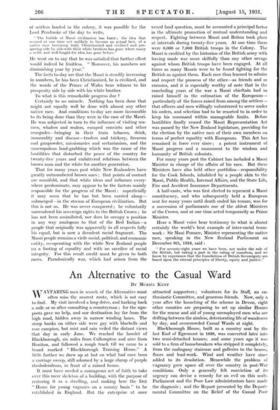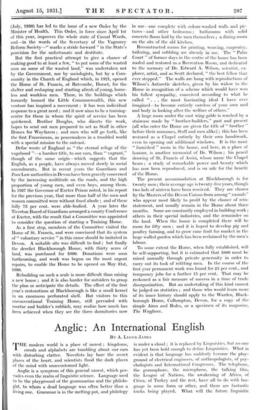An Alternative to the Casual Ward
BY MURIEL KENT WAYFARING men in search of the Alternative must often miss the nearest route, which is not easy to find. My visit involved a long drive, and harking back a mile or so after consulting a countryman ; for the sign- posts gave no help, and our destination lay far from the high road, hidden away in narrow winding lanes. The steep banks on either side were gay with bluebells and rose campion, but mist and rain veiled the distant views that day in early June. We reached the hamlet of Blackborough, six miles from Cullompton and nine from Honiton, and followed a rough track till we came to a board marked "Blackborough Training Home." A little further we drew up at last on what had once been a carriage sweep, still adorned by a large clump of purple rhododendrons, in front of a ruined house.
It must have needed a courageous act of faith to take over this mere skeleton of a building, with the purpose of restoring it as a dwelling, and making here the first "Home for young vagrants on a county basis" to be established in England. But the enterprise at once attracted supporters ; volunteers for its Staff, an en- thusiastic Committee, and generous friends. Now, only a year after the launching of the scheme in Devon, eight other counties are preparing to set up similar Homes for the rescue and aid of young unemployed men who are drifting between the aimless, deteriorating life of wanderers by day, and overcrowded Casual Wards at night.
Blackborough House, built as a country seat by the last Earl of Egremont in 1838, was converted later into two semi-detached houses; and some years ago it was sold to a firm of housebreakers who stripped it completely, from the mahogany staircase and galleries to the beams, floors and lead-work. Wind and weather have since added to its desolation. Meanwhile the problem of vagrancy grew apace all over the country in post-War conditions. Only a generally felt conviction of its urgency can devise a remedy for an evil on this scale. Parliament and the Poor Law administrators have made the diagnosis ; and the Report presented by the Depart- mental Committee on the Relief of the Casual Poor (July, 1930) has led to the issue of a new Order by the Minister of Health. This Order, in force since April 1st of this year, improves the whole state of Casual Wards, and—in the words of the Secretary of the Vagrancy Reform Society—" marks a stride forward " in the State's provision for the unfortunate and destitute.
But the first practical attempt to give a chance of making good to at least a few, "to put some of the wasted men on some of the wasted land," was undertaken not by the Government, nor by sociologists, but by a Com- munity in the Church of England which, in 1921, opened the Home of St. Francis, at Batcombe, Dorset, for the shelter and reshaping and starting afresh of young, home- less and workless men. There, in the buildings which formerly housed the Little Commonwealth, this new venture has inspired a movement ; it has won individual response to a great need ; and it now aims to be a training- centre for those in whom the spirit of service has been quickened. Brother Douglas, who directs the work, hopes to send out men prepared to act as Staff in other Homes for Wayfarers ; and men who will go forth, like the first Franciscans, as peacemakers in a troubled world with a special mission to the outcast.
Defoe wrote of England as "the eternal refuge of the vagabond "—a harsher title, to our ears, than "vagrant," though of the same origin—which suggests that the English, as a people, have always moved slowly in social amendments. But in recent years the Guardians and Poor Law authorities in Devon have been gravely concerned by the increasing multitude on the roads, and the high proportion of young men, and even boys, among them. In 1927 the Governor of Exeter Prison noted, in his report for the previous year, that more than half of the men and women committed were without fixed abode ; and of these fully 75 per cent. were able-bodied. A year later the Tiverton Board of Guardians arranged a county Conference at Exeter, with the result that a Committee was appointed to consider the question of starting a Training Home.
As a first step, members of the Committee visited the Rome of St. Francis, and were convinced that its system of" voluntary service " in this cause should be imitated in Devon. A suitable site was difficult to find ; but finally the derelict Blackborough House, with thirty acres of land, was purchased for /600. Donations were soon forthcoming, and work was begun on the most urgent repairs, to enable the Home to be opened on May 31st, 1930.
Rebuilding on such a scale is more difficult than raising a new house ; and it is also harder for outsiders to grasp the plan or anticipate the details. The effect of the first year's restorations at Blackborough is like a small kernel in an enormous perforated shell. But visitors to this unconventional Training Home, still pervaded with mortar and builder's rubbish, may realize how much has been achieved when they see the three dormitories now in use—one complete with colour-washed walls and pic- tures—and other bedrooms ; bathrooms with solid concrete floors laid by the men themselves ; a dining-room on the site of the old kitchen.
Reconstructed rooms for printing, weaving, carpentry, tailoring, and cobbling are already in use. The "Palm Court " of former days in the centre of the house has been roofed and restored as a Recreation Room, and dedicated to the memory of Dr. Edward A. Wilson, scientist, ex- plorer, artist, and as Scott declared, "the best fellow that ever stepped." The walls are hung with reproductions of Wilson's Antarctic sketches, given by his widow to the Home in recognition of a scheme which would have won his fullest sympathy, conceived according to what he called " . . the most fascinating ideal I have ever imagined—to become entirely careless of your own soul and body in looking after the welfare of others."
A large room under the east wing gable is reached by a staircase made by "brother-builders," past and present (all who enter the Home arc given the title of" brother" before their surnames, Staff and men alike) ; this has been restored as a Chapel entirely by their own handiwork, even to opening out additional windows. It is the most " furnished " room in the house, and here, in a place of honour, is another memorial of Dr. Wilson ; his pencil drawing of St. Francis of Assisi, whose name the Chapel bears ; a study of remarkable power and beauty which has now been reproduced, and is on sale for the benefit of the Home.
The present accommodation at Blackborough is for twenty men ; their average age is twenty-five years, though two lads of sixteen have been received. They are chosen by the Masters of the Devon Unions from among " casuals" who appear most likely to profit by the chance of rein- statement, and usually remain in the Home about three months. Some are constantly employed in building work ; others in their special industries, and the remainder on the land. When the house is completed there will be room for fifty men ; and it is hoped to develop pig and poultry farming, and to grow cane fruit for market in the large walled garden which has been reclaimed by the men's labour.
To some extent the Home, when fully established, will be self-supporting, but it is estimated that 1000 must be raised annually through private generosity in order to carry out its task of refitting men. In the course of the first year permanent work was found for 25 per cent., and temporary jobs for a further 15 per cent. That may be reckoned as a fair measure of success in a time of trade disorganization. But an undertaking of this kind cannot be judged on statistics ; and those who would learn more of its inner history should apply to the Warden, Black- borough Home, Cullompton, Devon, for a copy of the simple Aims and Rules, or a specimen of its magazine, The Wayfarer.































 Previous page
Previous page